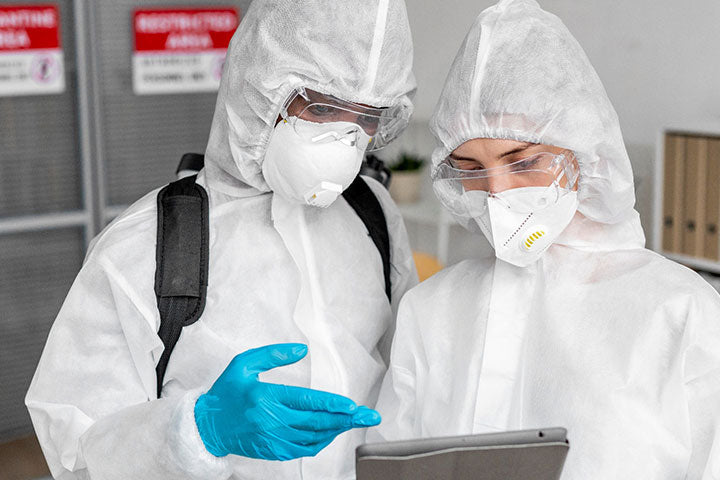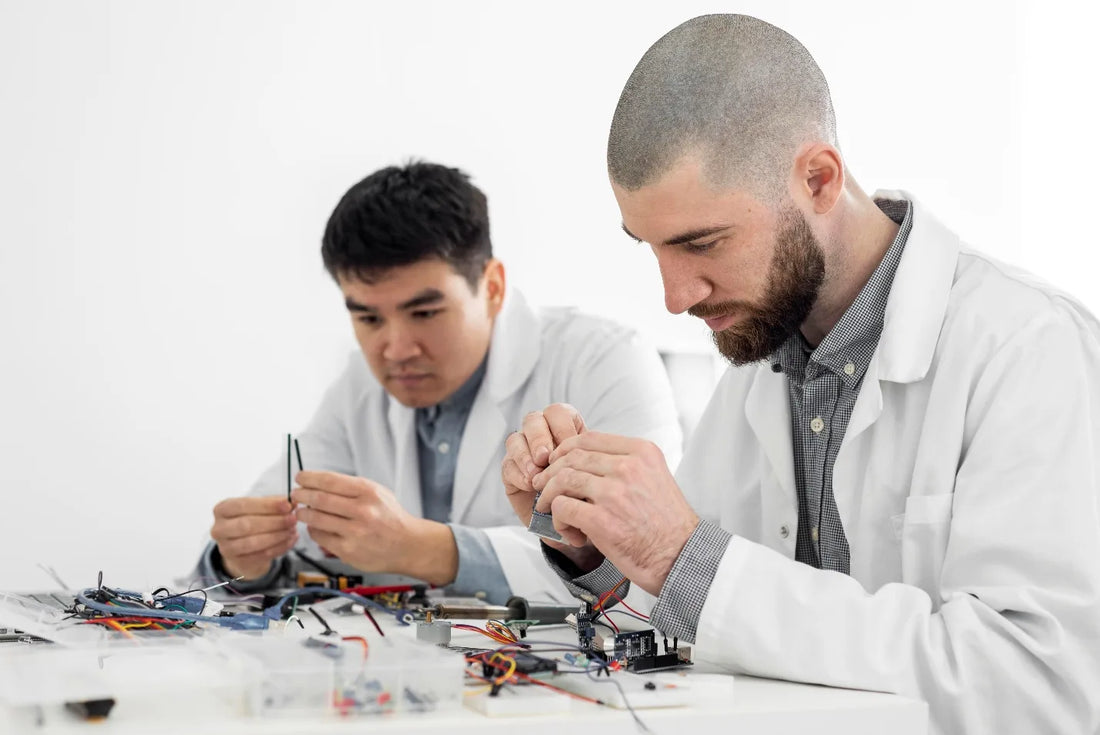E-Waste Disposal: How to Recycle Your Old Electronics Safely

Summary
Hiring an electronic waste disposal company is the best way to dispose of old and obsolete products. In this article, R&D Laboratory Equipment experts examine the various ways, challenges, and benefits of recycling old electrical products.
Introduction to Electronic Waste Disposal
Have you ever wondered what happened to that laptop you threw away? If it went in the garbage bins, it would have been sent directly to the landfills. However, if you handed it to an e-waste recycling company, it would have been recycled.
The concept of electronic waste disposal refers to the safe and responsible disposal of electronic and electrical equipment. Proper e-waste disposal involves more than simply discarding old devices. It involves recycling valuable materials, refurbishing usable equipment, and safely handling toxic components.
With e-waste volumes expected to reach over 120 million metric tonnes by 2050, it is everyone's responsibility to ensure the safety of vulnerable populations and the environment.
Understanding Electronic Waste: What Qualifies as Electronic Waste?
Electronic waste refers to any electronic product nearing the end of its lifespan. This term encompasses a wide range of devices, including computers, laptops, smartphones, VCRs, copiers, batteries, and other similar devices. These products become waste when discarded in waste bins or stored away without any intention to reuse their components.
The current methods of electronic waste disposal have far-reaching consequences for community health and the environment. Burning or melting electronics in an attempt to dispose of them exposes workers to hazardous chemicals and compounds, including lead, cadmium, mercury, and chlorofluorocarbons.
Items that qualify as e-waste include:
-
ICT and Telecommunications Equipment: These products include monitors, laptops, CPUs, screens, printers, and keyboards.
-
Office Electronics: These products include typewriters, photocopiers, telephones, fax machines, and other related equipment.
-
Large Household Appliances: These include freezers, refrigerators, air conditioners, cookers, radiators, and fans.
-
Small Household Appliances: These include air dryers, fryers, radios, rice cookers, etc.
-
Medical Equipment: This includes X-ray machines, microscopes, biosafety equipment, pipettes, and other related devices.
The Importance of E-Waste Recycling

Here are some of the reasons you should recycle your electronic waste:
-
It ensures environmental protection: Responsible e waste recycling protects the environment from harmful chemicals and substances, such as lead, cadmium, mercury, and nickel. These substances leach into the soil, damaging ecosystems and water bodies, and contributing to air pollution.
-
It helps conserve natural resources: Electronic recycling recovers valuable materials from discarded products. This means manufacturers don’t need new raw materials for their products; they can just recycle and reuse the e-waste components.
-
It reduces the amount of e-waste in landfills: Dumping used or defective electronic products in landfills is bad for the environment, workers, and families in the area. Toxic substances can leach into the soil, contaminating water bodies and causing health challenges. Additionally, e-waste that ends up in landfills is often incinerated, resulting in the release of toxic fumes and air pollution.
How to Recycle Your Old Electronics Safely
As electronic devices become obsolete or are replaced by newer models, they must be recycled to reduce environmental impact and recover valuable components.
1. Check Manufacturer & Retailer Take-Back Programs
Some electronic manufacturers, such as HP, Apple, and Samsung, offer take-back or recycling programs that allow you to return old devices for store credit. Retailers like Best Buy and Staples also accept a variety of old electronics for safe disposal.
2. Donate or Resell Usable Electronics
If your device is still functional, consider giving it a second life by donating it to a school, church, or nonprofit organization. You can also resell obsolete products on eBay or Facebook Marketplace. This reduces e-waste at landfills and reduces demand for new products.
3. Use Certified E-Waste Recycling Centers
Use electronic recycling centers that are certified by e-Stewards or R2 (Responsible Recycling) standards. These centers ensure that electronics are processed responsibly and with minimal environmental impact.
4. Properly Dispose of Batteries and Hazardous Components
Batteries, especially lithium-ion and lead-acid types, must never be thrown in the trash. They can leak harmful chemicals or even cause a fire. Use specialized battery disposal boxes at retailers, or take them to hazardous waste collection sites.
5. Wipe Data Before Recycling Electronics
Before recycling your smartphones, computers, and other devices that store personal information, ensure that you delete all the data stored on them. Perform a factory reset, remove all hard drives and SIM cards to protect your privacy.
Legal Regulations & Compliance for E-Waste Management
E waste management is guided by regulations that require the proper handling, storage, and disposal of used electrical and electronic equipment. A significant regulation is the Electronic Waste Recycling Act (EWRA), which requires manufacturers to finance the collection and recycling of certain electronic products.
Additionally, organizations such as Responsible Recycling (R2) and e-Stewards provide guidelines for safe and efficient disposal of electronic waste.
The Future of E-Waste Recycling: Innovations & Sustainable Solutions

The future of electronic waste disposal depends on increased collaboration between governments and manufacturers at both local and international levels. Businesses must develop products with sustainability in mind and participate in recycling programs to promote environmental responsibility. At the same time, governments must make clear and enforceable regulations.
Some innovative solutions include:
-
Extended Producer Responsibility: This concept holds manufacturers accountable for their products throughout their lifecycle.
-
Innovative Product Design: Some companies are adopting the cradle-to-cradle design principle, where product components can be fully reused or recycled, thereby minimizing waste and promoting sustainability.
-
Efficient Recycling Technologies: New AI-driven robots can sort e-waste more efficiently, speeding up the recycling and separation process.
Conclusion
Throwing your batteries in the waste bin is not just dangerous, but potentially fatal. The same applies to every electronic product you send to landfills. The best way to get rid of your old electronics is to drop them off at an electronic waste disposal company. And if they are still usable, you can donate them to a nonprofit organization or sell them online.
Contact R&D Laboratory Equipment for more information on the effects of wastes and electronic disposal.
FAQs
1. How to recycle e-waste safely?
Safe e waste recycling starts from dropping off at collection points to be transported to a certified recycler. You can also sell or donate usable equipment.
2. What are the steps of the electronic disposal chain?
Electronic waste disposal or recycling processes include collection, sorting, dismantling, shredding, mechanical separation, and recovery.
3. What is the most effective method for disposing of e-waste?
Recycling is the most effective disposal method for most types of trash, particularly e-waste.
4. What are examples of e-waste?
Examples of e-waste include freezers, computers, laptops, smartphones, medical equipment, toys, batteries, printers, etc.
5. What are the 3 R’s of recycling?
The three basic principles of e waste management include reduce, reuse, and recycle.
6. What is one way to reduce e-waste?
You can reduce e-waste by refurbishing old equipment.
7. Why is it called e-waste?
E-waste is an abbreviation for electronic and electrical waste.
8. What are the benefits of recycling?
Recycling enables the conservation of resources, reduces pollution, saves energy, and creates employment opportunities.
9. Can we recycle at home?
Yes, keeping a recycling bag by your waste bin reminds everyone to recycle.
10. How do you dispose of electronic waste?
Use certified recyclers to get rid of your old electronics.






